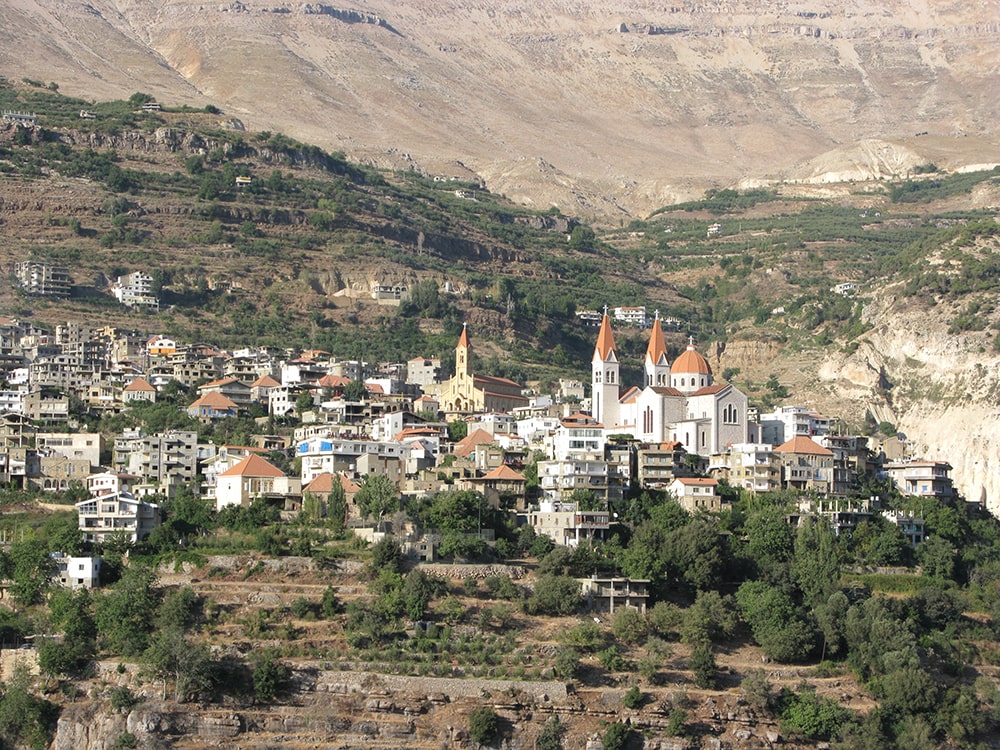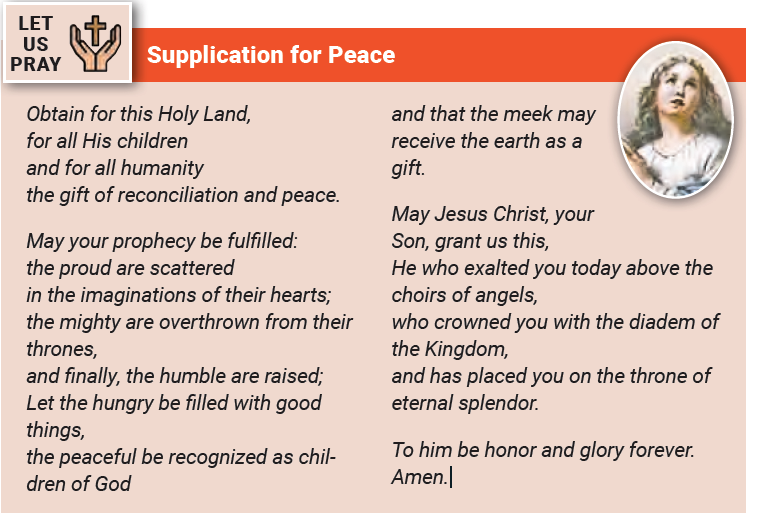
PROSPECT HEIGHTS — “You have your Lebanon and its dilemma. I have my Lebanon and its beauty.”
Those prophetic words were written by Kahlil Gibran in the 1920s, and some believe they may be truer today than ever before.
Gibran knew the dilemma faced by a country in the Middle East that is open to a peaceful existence for Christians, Muslims, and Jews alike, as well as for people of all faiths and religions.
Lebanon is being ravaged by rockets, and the people of Beirut, a city once called the “Paris of the Middle East,” are once again watching their world be torn apart. With Israeli missiles targeting Hezbollah strongholds in southern Lebanon, Christians are stuck in the middle of the bombings and what is already a devastating campaign.
Since Sept. 17, Israel has conducted 1,500 airstrikes targeting Hezbollah positions in Lebanon that have killed over 1,300 people and injuring nearly 7,500 others, according to the Lebanese health ministry.
Last month, Hezbollah began firing rockets at Israel in solidarity with the Palestinians in Gaza and has set a ceasefire in Gaza as a condition to stop its cross-border attacks.
On Sept. 25, Pope Francis said he was saddened by the violence in the region.
“I hope that the international community will make every effort to stop this terrible escalation. It is unacceptable,” Pope Francis said during his weekly general audience.
 According to Bishop Gregory Mansour of the Eparchy of Saint Maron of Brooklyn and pastor of Our Lady of Lebanon Maronite Cathedral in Brooklyn Heights, schools, churches, convents, monasteries, and hospitals in Lebanon are being turned into refugee centers and are all working tirelessly trying to help those injured or displaced.
According to Bishop Gregory Mansour of the Eparchy of Saint Maron of Brooklyn and pastor of Our Lady of Lebanon Maronite Cathedral in Brooklyn Heights, schools, churches, convents, monasteries, and hospitals in Lebanon are being turned into refugee centers and are all working tirelessly trying to help those injured or displaced.
“The mother of God who has never forgotten Lebanon, she helps them to make ends meet,” Bishop Mansour told The Tablet.
Bishop Mansour has family from southern Lebanon, the most dangerous part of the region, who have fled to safer areas further north.
Back in the United States, Bishop Mansour said the 46 parishes in the Eparchy of Saint Maron of Brooklyn and the 46 parishes of the Eparchy of Our Lady of Lebanon in Los Angeles are assisting in any way they can.
“Without this outside help, the Christians of Lebanon would probably be completely forgotten,” Bishop Mansour said.
Striving for Harmony
Modern Lebanon was founded as a country focused on a harmonious existence between Christians, Sunnis, and Shiites. In the words of Bishop Mansour, “It was built on a conviviality” between the different faiths.
“That was the intention of the Maronite Patriarch when he went to Versailles in 1919 and asked that Lebanon be carved out of Greater Syria to be a religious refuge for all the religious minorities of that area, and so in the boundaries he took a huge risk and not only included Mount Lebanon, which is where all the Christians lived, but also included the south, the north and the Bekaa Valley purposely, knowing that he was including Sunnis, Shiites and non-Maronites because he really believed that Lebanon could be a conviviality.
“But the hatred that is brought in today by Hezbollah has changed the true face of Lebanon,” Bishop Mansour explained, adding the country cannot survive unless the group is removed from power.
“It cannot be Hezbollah rules and the rest follow. It has to be a shared democracy between Christians and Muslims,” Bishop Mansour said.
Bishop Mansour explained that in the first attempt to create the state in 1919 and then in 1940, when Lebanon won independence from France, there was a national pact to create a shared democracy. The pact, created by the president, mandated that the president would always be a Maronite, the speaker of the house would always be Shiite, and the prime minister would always be Sunni. It was done that way so that nobody could dominate, and it would always be a shared democracy.
As a result, during the mid-20th century, Lebanon was one of the wealthiest and most prosperous countries in the Middle East and the only state where 60% of the population was Christian. However, that number has dwindled over the years.
According to 2023 U.S. Department of State figures, Muslims account for 69.3% of the population, followed by Christians at 30.5%. Of those, 52.5% are Maronite Catholic, followed by Greek Orthodox at 25%. The remaining 22.5% are divided among Melkite Catholics, Armenian Apostolics, Protestants, and other Christian minorities.
According to Bishop Mansour, even when Christians were the majority, they wanted to share power. The current situation goes against the entire essence of what Lebanon was intended to be — a nation with an inclusive government that reflects the people, upholds their freedoms, and allows Christians and Muslims to live together in relative harmony.
“Today, the Christians are thrown in the middle of it all, but in the midst of this storm, Muslims and Christians alike are wanting to pray and embrace their faith,” Bishop Mansour said. “So, there’s a Lebanon that lives on miracles and it can revive if the good guys prevail. And I have that hope.
“It’s not based on reality, but it’s based on Christian hope.”

Solidarity Amidst Conflict
John Abi-Habib, a parishioner at Our Lady of Lebanon who serves as honorary consul general of Lebanon from New Jersey, and his wife Sonia have family in Lebanon. He noted that people on the outside may not realize the response of the Lebanese people to the conflict.
“The Christian Lebanese living in safer areas have opened their homes and hearts to the displaced people in the south and the Bekaa Valley,” Abi-Habib said.
“They have also opened their schools and churches providing the displaced people with all the services they can offer them — food, medicine, and entertainment — to take their minds off the tragedy that has befallen them.”
The Sept. 27 Israeli airstrike killing Hezbollah leader Hassan Nasrallah has sparked new fears in the war-torn nation. Father Michael Ellias, pastor of St. Mary’s Antiochian Orthodox Church in Bay Ridge, voiced his worries for parishioners in the country.
“We still have our own parishioners who are traveling in Lebanon, and I’m concerned about their safety … and for their families as well,” Father Ellias said.
“Everybody recognizes that it’s a calamitous situation, and it’s only been aggravated by the death of Nasrallah because not only was he the leader of a military faction, but Hezbollah plays a big part in the Lebanese government,” Father Ellias added. “We are all going to be praying for a quick resolution to this situation.”
Lebanon’s story is one of hope.
Though the country has endured so much over the years, including a 15-year civil war, falling under Syrian dominance, and then under Israeli dominance in the south, Lebanon survived, and hope remains that it will persevere through the latest conflict.
Gibran, a Maronite Catholic and the author of “The Prophet,” had a deep love and faith in what Lebanon stood for. He wrote, “If Lebanon were not my country, I would have chosen it to be.” As he got older, he admitted, “I shall never again hear the songs of Lebanon, except in my dreams.”
According to Bishop Mansour and Father Ellias, the dream still lives, and Lebanon will hopefully regain its birthright as a bastion of peace in an otherwise divided region of the world.
